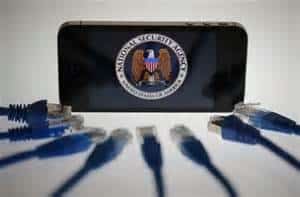Consumer Watchdog has joined the Electronic Privacy Information Center (EPIC) and 25 other organizations  in telling President Obama and Attorney General Eric Holder not to seek re-authorization of the National Security Agency's bulk telephone record collection.
in telling President Obama and Attorney General Eric Holder not to seek re-authorization of the National Security Agency's bulk telephone record collection.
"We write to urge you not to renew the Section 215 Bulk Telephony Metadata Program when the current order expires on June 20, 2014. The program is not effective. It should end," the groups wrote in their letter to the President and Attorney General.
The NSA program needs approval from the Foreign Intelligence Surveillance Court every 90 days in order to continue its collection of records, which track the numbers people call as well as the length and frequency of their conversations. The program does not intercept the content of the calls.
But, as demonstrated by Stanford researchers Jonathan Mayer and Patrick Mutchler, this information about people's calls, so called "metadata" because it's data about data, can be extremely revealing and privacy invasive.
Both the Privacy and Civil Liberties Oversight Board report and the President's Review Group report found the NSA's bulk collection to be ineffective. In January, the President committed to "end the Section 215 bulk metadata program as it currently exists."
The coalition's letter cited Sen. Patrick Leahy (D-VT.) as repeatedly saying, “the administration has not demonstrated that the Section 215 phone records collection program is uniquely valuable enough to justify the massive intrusion on Americans' privacy.”
The letter concluded, "Legislative proposals are pending in Congress. More needs to be done. But the decision to renew the Section 215 authority is solely within the authority of the Department of Justice. We urge you to end bulk collection now."
 In addition Consumer Watchdog and Epic, the following organizations signed the letter: Access, Advocacy for Principled Action in Government, American Association of Law Libraries, American Civil Liberties Union, American Library Association, Association for Research Libraries, Bill of Rights Defense Committee (BORDC), Center for Democracy & Technology, Center for Digital Democracy, Center for Financial Privacy and Human Rights, Center for Media Justice, Charity & Security Network, Citizens forResponsibility and Ethics in Washington (CREW), Council on American-Islamic Relations, Defending Dissent Foundation. Demand Progress, Electronic Frontier Foundation, Freedom of the Press Foundation, Government Accountability Project, National Association of Criminal Defense Lawyers, National Security Counselors, OpenTheGovernment.org, Patient Privacy Rights, Project On Government Oversight (POGO), and Sikh American Legal Defense and Education Fund (SALDEF).
In addition Consumer Watchdog and Epic, the following organizations signed the letter: Access, Advocacy for Principled Action in Government, American Association of Law Libraries, American Civil Liberties Union, American Library Association, Association for Research Libraries, Bill of Rights Defense Committee (BORDC), Center for Democracy & Technology, Center for Digital Democracy, Center for Financial Privacy and Human Rights, Center for Media Justice, Charity & Security Network, Citizens forResponsibility and Ethics in Washington (CREW), Council on American-Islamic Relations, Defending Dissent Foundation. Demand Progress, Electronic Frontier Foundation, Freedom of the Press Foundation, Government Accountability Project, National Association of Criminal Defense Lawyers, National Security Counselors, OpenTheGovernment.org, Patient Privacy Rights, Project On Government Oversight (POGO), and Sikh American Legal Defense and Education Fund (SALDEF).











